2013年高考英语福建卷完型填空翻译与精析
2013福建高考英语卷We have been driving in fog all morning答案与解析
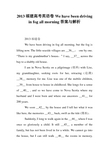
2013·福建卷We have been driving in fog all morning, but the fog is lifting now. The little seaside villages are __36__,one by one. “There is my grandmother’s house,” I say, __37__ across the bay to a shabby old house.I am in Nova Scotia on a pilgrimage (朝圣) with Lise, my granddaughter, seeking roots for her, retracing (追溯) __38__ memory for me. Lise was one of the mobile children, __39__ from house to house in childhood. She longs for a sense of __40__ , and so we have come to Nova Scotia where my husband and I were born and where our ancestors __41__ for 200 years.We soon __42__ by the house and I tell her what it was like here, the memories __43__ back, swift as the tide (潮水).Suddenly, I long to walk again in the __44__ where I was once so gloriously a child. It still __45__ a member of the family, but has not been lived in for a while. We cannot go into the house, but I can still walk __46__ the rooms in memory. Here, my mother __47__ in her bedroom window and wrote in her diary. I can still see the enthusiastic family __48__ into and out of the house. I could never have enough of being __49__ them. However, that was long after those childhood days. Lise __50__ attentively as I talk and then says, “So this is where I __51__ ; where I belong.”She has __52__ her roots. To know where I come from is one of the great longings of the human __53__. To be rooted is “to have an origin”. We need __54__ origin. Looking backward, we discover what is unique in us; learn the __55__ of “I”. We must all go home again—in reality or memory.36.A. appearing B. movingC. exposing D. expanding37.A. referring B. travellingC. pointing D. coming38.A. shared B. shortC. fresh D. treasured39.A. passed B. raisedC. moved D. sent40.A. home B. dutyC. reality D. relief41.A. built B. livedC. remained D. explored42.A. catch up B. pull upC. step down D. come down43.A. falling B. turningC. rushing D. bringing44.A. yard B. villageC. room D. house45.A. adapts to B. appeals toC. belongs to D. occurs to46.A. across B. throughC. along D. past47.A. lay B. playedC. stood D. sat48.A. marching B. lookingC. breaking D. pouring49.A. between B. withC. near D. behind50.A. wonders B. listensC. reacts D. agrees51.A. began B. grewC. studied D. stayed52.A. deepened B. recognizedC. accepted D. found53.A. heart B. rightsC. interest D. behaviors54.A. one B. itsC. that D. every55.A. meaning B. expressionC. connection D. background【要点综述】本文讲述了一位奶奶带着孙女回到老家——她们祖先生活的地方,去寻根访祖,追忆乡思,从而引发感慨的故事。36.A考查动词词义辨析。雾慢慢散去之后,海边的小村庄就显露出来了,才有后文说到的“房子”。appear “出现”,只有A符合句意。37.C考查动词辨析。“我”指着港湾对面的一座破旧的房子说。point to意为“指向”,句中为现在分词短语作伴随状语。refer to “查阅,有关,适用于”不符合语境。38.D考查形容词词义辨析。treasured意为“宝贵的”。对作者来说回家乡是追忆宝贵的儿时记忆。39.C考查动词词义辨析。前一句提到Lise是一个不断“移动的”小孩,即她到处漂泊,所以经常“搬迁”,move最能体现此意。40.A考查名词词义辨析。Lise和她奶奶回家乡的目的就是寻根访祖,就是要找到她的“家”,只有home才符合文章的中心思想。41.B考查动词词义辨析。她们的祖先在那里已经生活200年了。只有lived符合语境。42.B考查动词词组辨析。句意为:不一会儿我们在那座屋子旁边停了下来。pull up有“停住”之意。catch up赶上;step down走下来;come down下来。故只有选项B符合语境。43.C考查动词词义辨析。触景生情,一看到自己生活过的屋子,奶奶就不禁回想往事,记忆像潮水般涌入脑海。rush强调快速、大量,最能体现语境。44.D考查名词辨析。根据前文可知,她们当时的位置在她的故居,小时候住的房子,故选house。4ቤተ መጻሕፍቲ ባይዱ.C考查动词词组辨析。句意为:这个屋子现在仍然属于她们的一个亲戚。belong to属于;adapt to调整,适应;appeal to对……有吸引力,呼吁;occur to发生。46.B考查介词词义辨析。walk through the room穿过房间,through是指“从……中间穿过”,across意为“从……上面穿过,横跨”。47.D考查动词词义辨析。写日记当然应该坐着写,所以应选sat。48.D考查动词词义辨析。pour原意为“倾倒”,即家人和亲人很多。march “前进,行进”,不能体现“多”的意思,D为最佳答案。49.B考查介词辨析。本句表达了作者思念亲人的心情,意为:我与亲人们在一起,时间再久次数再多也不嫌多。be with sb与某人在一起。50.B考查动词辨析。根据下文“…as I talks and then says…”可知,Lise正在听,故答案为B。51.A考查动词辨析。根据第二段末句“…where my husband and I were born…”可知,这座房子是她的出生地,她的生命从这里开始,所以答案为began。52.D考查动词词义辨析。纵观全文,我们得知她们的这次寻根之旅是不枉此行,Lise找到了她的根。53.A考查名词词义辨析。寻根是人类内心深处的一种渴望,只有heart符合句意。behavior行为;right权利;interest兴趣。54.C考查代词词义辨析。我们需要那种根。that用于指代前文提到的“origin”。55.A考查名词词义辨析。meaning含义;expression表情,表达;connection联系;background背景。
2013年高考福建英语题精解精析解析版(精编版)

本解析为学科网名师解析团队原创,授权学科网独家使用,如有盗用,依法追责![学科网试卷总评]从整份试卷来看,难易度适中,基本上以中档题和基础题为主,没有偏题、怪题。
试题体现创新性,探究性,强化能力立意。
命题注重“双基”,考查zxxk核心知识、切实减轻学生负担。
试题突出了对学生语篇意识、语用能力、逻辑思维能力等方面的考查zxxk。
大部分的试题都是针对学生的考试能力进行设计的,符合教学理念和学科特点,符合《考试说明》。
试卷内容也是比较贴近时代、贴近社会、贴近生活,突出文化导向,符合考生的生活经验和认知水平。
知识面覆盖比较广,加强了对考生综合语言能力的考查zxxk,充分体现了《课程标准》中对语言技能、语言知识、情感态度、学习策略和跨文化意识的要求。
试卷的总体结构、长度、试题命题原则、难度、能力测试取向都与去年大体上保持一致。
试卷有利于高等学校选zxxk拔人才,对于明年的中学教学具有重要的导向意义。
单项选zxxk择题覆盖面广,考点涉及定语从句、非谓语动词、时态、虚拟语气、冠词、名词、形容词、副词、介词短语、动词辨析、动词短语、倒装句、主谓一致、状语从句的省略、情境交际等。
这些都是中学阶段的重点英语语法项目和英语语言的核心知识,体现时效性:21题说的是中国梦、32题是H7N9,和实事联系紧密,试题情景设置合理,选zxxk项设置科学,突出在具体语言情景中考查zxxk考生对语言知识的运用能力。
完形填空一改往年夹叙夹议的老面孔,在选zxxk材上推陈出新,改编了一篇“寻根访祖,追忆乡思”的优美散文,文章内容优美,意境隽永,立意深刻,给人精神上的享受和心灵上的熏陶。
介绍了作者和孙女的寻根之旅,每个人都渴望知道自己来自何方,找到自我,可以更加明白“我”的含义。
考点以实词为主,包括动词12题,名词4题、形容词副词1题,介词题2、代词1题。
文章277词,设题80词,完全符合《考试说明》要求。
阅读所用材料全部选zxxk自英语国家主流报刊杂志和教材,语言原汁原味,文化信息丰富;材料内容健康,体裁多样、题材广泛,在命题上,注意难度、效度、区分度的把握,设题上充分考虑学生的认知特点,题目由易到难,循序渐进,A篇是故事类短文,B篇介绍了Google新推出的智能眼镜,文章既反映了该领域的最新科技成果,同时可以激发考生的阅读兴趣。
2013年高考真题(福建卷)--英语(解析版)

2013福建高考英语试题(解析版)第I卷(选择题共115分)第一部分听力(共两节,满分30分)第一节1. What does the man want to do?A. Take photos.B. Buy a camera.C. Help the woman.2. What are the speakers talking about?A. A noisy night.B. Their life in town.C. A place of living.3. Where is the man now?A. On his way.B. In a restaurant.C. At home.4. What will Celia do?A. Find a player.B. Watch a game.C. Play basketball.5. What day is it when the conversation takes place?A. Saturday.B. Sunday.C. Monday.笫二节(共15小题;每小题1.5分,满分22.5分)听第6段材料,回答第6、7题。
6. What is Sara going to do?A. Buy John a gift.B. Give John a surprise.C. Invite John to France.7. What does the man think of Sara's plan?A. Funny.B. Exciting.C. Strange.听第7段材料,回答第8、9题。
8. Why does Diana say sorry to Peter?A. She has to give up her travel plan.B. She wants to visit another city.C. She needs to put off her test.9. What does Diana want Peter to do?A. Help her with her study.B. Take a book to her friend.C. Teach a geography lesson.听第8段材料,回答第10至12题。
【Word解析版】2013年普通高等学校招生全国统一考试英语(福建卷)1
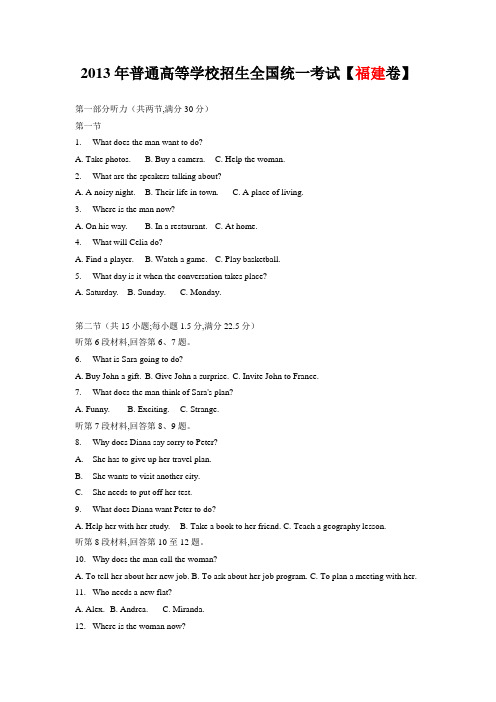
2013年普通高等学校招生全国统一考试【福建卷】第一部分听力(共两节,满分30分)第一节1. What does the man want to do?A. Take photos.B. Buy a camera.C. Help the woman.2. What are the speakers talking about?A. A noisy night.B. Their life in town.C. A place of living.3. Where is the man now?A. On his way.B. In a restaurant.C. At home.4. What will Celia do?A. Find a player.B. Watch a game.C. Play basketball.5. What day is it when the conversation takes place?A. Saturday.B. Sunday.C. Monday.笫二节(共15小题;每小题1.5分,满分22.5分)听第6段材料,回答第6、7题。
6. What is Sara going to do?A. Buy John a gift.B. Give John a surprise.C. Invite John to France.7. What does the man think of Sara's plan?A. Funny.B. Exciting.C. Strange.听第7段材料,回答第8、9题。
8. Why does Diana say sorry to Peter?A. She has to give up her travel plan.B. She wants to visit another city.C. She needs to put off her test.9. What does Diana want Peter to do?A. Help her with her study.B. Take a book to her friend.C. Teach a geography lesson.听第8段材料,回答第10至12题。
2013年普通高等学校招生全国统一考试英语试卷 精编word版(福建省卷)(有答案)
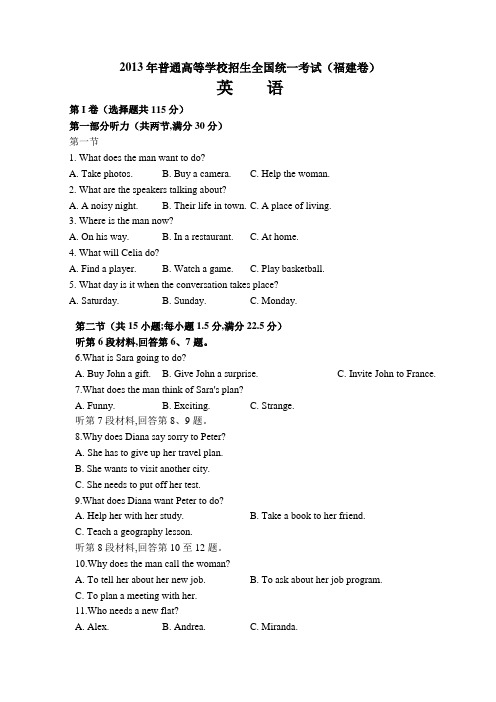
2013年普通高等学校招生全国统一考试(福建卷)英语第I卷(选择题共115分)第一部分听力(共两节,满分30分)第一节1. What does the man want to do?A. Take photos.B. Buy a camera.C. Help the woman.2. What are the speakers talking about?A. A noisy night.B. Their life in town.C. A place of living.3. Where is the man now?A. On his way.B. In a restaurant.C. At home.4. What will Celia do?A. Find a player.B. Watch a game.C. Play basketball.5. What day is it when the conversation takes place?A. Saturday.B. Sunday.C. Monday.笫二节(共15小题;每小题1.5分,满分22.5分)听第6段材料,回答第6、7题。
6.What is Sara going to do?A. Buy John a gift.B. Give John a surprise.C. Invite John to France.7.What does the man think of Sara's plan?A. Funny.B. Exciting.C. Strange.听第7段材料,回答第8、9题。
8.Why does Diana say sorry to Peter?A. She has to give up her travel plan.B. She wants to visit another city.C. She needs to put off her test.9.What does Diana want Peter to do?A. Help her with her study.B. Take a book to her friend.C. Teach a geography lesson.听第8段材料,回答第10至12题。
2013年高考英语完形填空练习题及答案解析
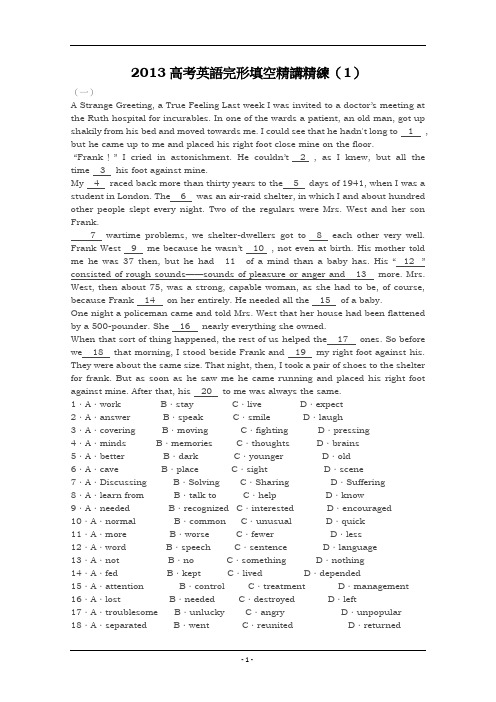
2013高考英語完形填空精講精練(1)(一)A Strange Greeting, a True Feeling Last week I was invited to a doctor‟s meeting at the Ruth hospital for incurables. In one of the wards a patient, an old man, got up shakily from his bed and moved towards me. I could see that he hadn't long to 1 , but he came up to me and placed his right foot close mine on the floor. “Frank!” I cried in astonishment. He couldn‟t 2 , as I knew, but all the time 3 his foot against mine.My 4 raced back more than thirty years to the 5 days of 1941, when I was a student in London. The 6 was an air-raid shelter, in which I and about hundred other people slept every night. Two of the regulars were Mrs. West and her son Frank.7 wartime problems, we shelter-dwellers got to 8 each other very well. Frank West 9 me because he wasn‟t10 , not even at birth. His mother told me he was 37 then, but he had 11 of a mind than a baby has. His “12 ” consisted of rough sounds——sounds of pleasure or anger and 13 more. Mrs. West, then about 75, was a strong, capable woman, as she had to be, of course, because Frank 14 on her entirely. He needed all the 15 of a baby.One night a policeman came and told Mrs. West that her house had been flattened by a 500-pounder. She 16 nearly everything she owned.When that sort of thing happened, the rest of us helped the 17 ones. So before we 18 that morning, I stood beside Frank and 19 my right foot against his. They were about the same size. That night, then, I took a pair of shoes to the shelter for frank. But as soon as he saw me he came running and placed his right foot against mine. After that, his 20 to me was always the same.1〃A〃work B〃stay C〃live D〃expect2〃A〃answer B〃speak C〃smile D〃laugh3〃A〃covering B〃moving C〃fighting D〃pressing4〃A〃minds B〃memories C〃thoughts D〃brains5〃A〃better B〃dark C〃younger D〃old6〃A〃cave B〃place C〃sight D〃scene7〃A〃Discussing B〃Solving C〃Sharing D〃Suffering8〃A〃learn from B〃talk to C〃help D〃know9〃A〃needed B〃recognized C〃interested D〃encouraged10〃A〃normal B〃common C〃unusual D〃quick11〃A〃more B〃worse C〃fewer D〃less12〃A〃word B〃speech C〃sentence D〃language13〃A〃not B〃no C〃something D〃nothing14〃A〃fed B〃kept C〃lived D〃depended15〃A〃attention B〃control C〃treatment D〃management 16〃A〃lost B〃needed C〃destroyed D〃left17〃A〃troublesome B〃unlucky C〃angry D〃unpopular18〃A〃separated B〃went C〃reunited D〃returned19〃A〃pushed B〃tried C〃showed D〃measured20〃A〃nodding B〃greeting C〃meeting D〃acting參考答案及解析1—5 CADBB 6—10 DCDCA 11—15 DBBDA 16—20 ABADB1〃C 上文的“incurables"表明這位老人是不治之症患者,存活的時間不會太長。
2013年高考英语试题分类汇编 故事类完形填空 Word版含解析
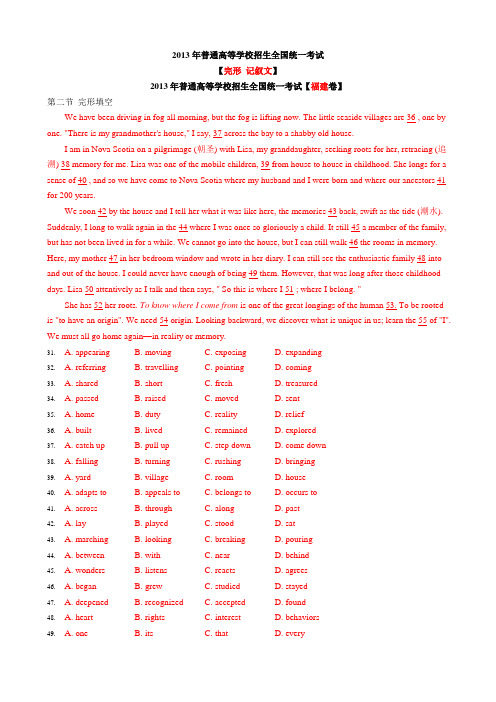
2013年普通高等学校招生全国统一考试【完形记叙文】2013年普通高等学校招生全国统一考试【福建卷】第二节完形填空We have been driving in fog all morning, but the fog is lifting now. The little seaside villages are 36 , one by one. "There is my grandmother's house," I say, 37 across the bay to a shabby old house.I am in Nova Scotia on a pilgrimage (朝圣) with Lisa, my granddaughter, seeking roots for her, retracing (追溯) 38 memory for me. Lisa was one of the mobile children, 39 from house to house in childhood. She longs for a sense of 40 , and so we have come to Nova Scotia where my husband and I were born and where our ancestors 41 for 200 years.We soon 42 by the house and I tell her what it was like here, the memories 43 back, swift as the tide (潮水). Suddenly, I long to walk again in the 44 where I was once so gloriously a child. It still 45 a member of the family, but has not been lived in for a while. We cannot go into the house, but I can still walk 46 the rooms in memory. Here, my mother 47 in her bedroom window and wrote in her diary. I can still see the enthusiastic family 48 into and out of the house. I could never have enough of being 49 them. However, that was long after those childhood days. Lisa 50 attentively as I talk and then says, " So this is where I 51 ; where I belong. "She has 52 her roots. To know where I come from is one of the great longings of the human 53. To be rooted is "to have an origin". We need 54 origin. Looking backward, we discover what is unique in us; learn the 55 of "I". We must all go home again—in reality or memory.31. A. appearing B. moving C. exposing D. expanding32. A. referring B. travelling C. pointing D. coming33. A. shared B. short C. fresh D. treasured34. A. passed B. raised C. moved D. sent35. A. home B. duty C. reality D. relief36. A. built B. lived C. remained D. explored37. A. catch up B. pull up C. step down D. come down38. A. falling B. turning C. rushing D. bringing39. A. yard B. village C. room D. house40. A. adapts to B. appeals to C. belongs to D. occurs to41. A. across B. through C. along D. past42. A. lay B. played C. stood D. sat43. A. marching B. looking C. breaking D. pouring44. A. between B. with C. near D. behind45. A. wonders B. listens C. reacts D. agrees46. A. began B. grew C. studied D. stayed47. A. deepened B. recognized C. accepted D. found48. A. heart B. rights C. interest D. behaviors49. A. one B. its C. that D. every50. A. meaning B. expression C. connection D. background[定文体抓主旨]:本文是一篇记叙文,取材于Ardis Whitman的You must go home again。
2013高考真题试卷福建卷及答案
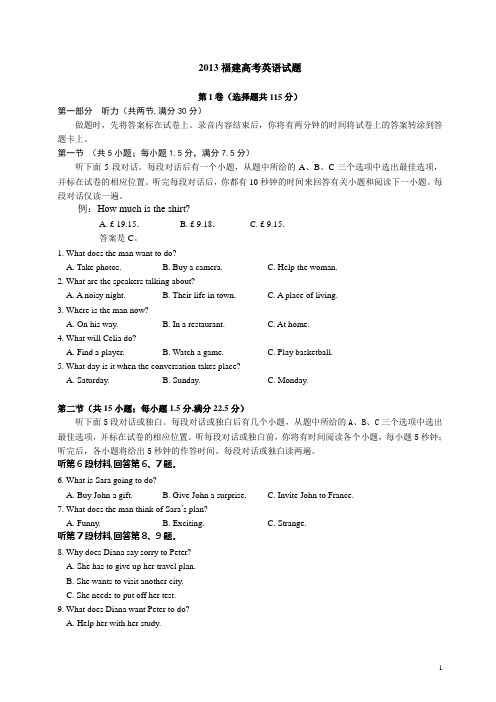
2013福建高考英语试题第I卷(选择题共115分)第一部分听力(共两节,满分30分)做题时,先将答案标在试卷上。
录音内容结束后,你将有两分钟的时间将试卷上的答案转涂到答题卡上。
第一节(共5小题;每小题1.5分,满分7.5分)听下面5段对话。
每段对话后有一个小题,从题中所给的A、B、C三个选项中选出最佳选项,并标在试卷的相应位置。
听完每段对话后,你都有10秒钟的时间来回答有关小题和阅读下一小题。
每段对话仅读一遍。
例:How much is the shirt?A. £ 19.15.B. £ 9.18.C. £ 9.15.答案是C。
1. What does the man want to do?A. Take photos.B. Buy a camera.C. Help the woman.2. What are the speakers talking about?A. A noisy night.B. Their life in town.C. A place of living.3. Where is the man now?A. On his way.B. In a restaurant.C. At home.4. What will Celia do?A. Find a player.B. Watch a game.C. Play basketball.5. What day is it when the conversation takes place?A. Saturday.B. Sunday.C. Monday.笫二节(共15小题;每小题1.5分,满分22.5分)听下面5段对话或独白。
每段对话或独白后有几个小题,从题中所给的A、B、C三个选项中选出最佳选项,并标在试卷的相应位置。
听每段对话或独白前,你将有时间阅读各个小题,每小题5秒钟;听完后,各小题将给出5秒钟的作答时间。
2013年高考福建省英语及答案
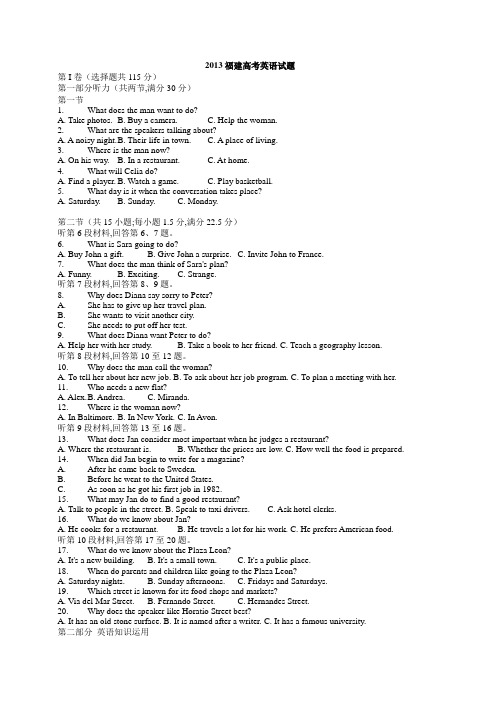
2013福建高考英语试题第I卷(选择题共115分)第一部分听力(共两节,满分30分)第一节1. What does the man want to do?A. Take photos.B. Buy a camera.C. Help the woman.2. What are the speakers talking about?A. A noisy night.B. Their life in town.C. A place of living.3. Where is the man now?A. On his way.B. In a restaurant.C. At home.4. What will Celia do?A. Find a player.B. Watch a game.C. Play basketball.5. What day is it when the conversation takes place?A. Saturday.B. Sunday.C. Monday.笫二节(共15小题;每小题1.5分,满分22.5分)听第6段材料,回答第6、7题。
6. What is Sara going to do?A. Buy John a gift.B. Give John a surprise.C. Invite John to France.7. What does the man think of Sara's plan?A. Funny.B. Exciting.C. Strange.听第7段材料,回答第8、9题。
8. Why does Diana say sorry to Peter?A. She has to give up her travel plan.B. She wants to visit another city.C. She needs to put off her test.9. What does Diana want Peter to do?A. Help her with her study.B. Take a book to her friend.C. Teach a geography lesson.听第8段材料,回答第10至12题。
2013全国统一高考(福建卷)英语试题及答案

2013福建高考英语试题第I卷(选择题共115分)第一部分听力(共两节,满分30分)第一节1. What does the man want to do?A. Take photos.B. Buy a camera.C. Help the woman.2. What are the speakers talking about?A. A noisy night.B. Their life in town.C. A place of living.3. Where is the man now?A. On his way.B. In a restaurant.C. At home.4. What will Celia do?A. Find a player.B. Watch a game.C. Play basketball.5. What day is it when the conversation takes place?A. Saturday.B. Sunday.C. Monday.笫二节(共15小题;每小题1.5分,满分22.5分)听第6段材料,回答第6、7题。
6. What is Sara going to do?A. Buy John a gift.B. Give John a surprise.C. Invite John to France.7. What does the man think of Sara's plan?A. Funny.B. Exciting.C. Strange.听第7段材料,回答第8、9题。
8. Why does Diana say sorry to Peter?A. She has to give up her travel plan.B. She wants to visit another city.C. She needs to put off her test.9. What does Diana want Peter to do?A. Help her with her study.B. Take a book to her friend.C. Teach a geography lesson.听第8段材料,回答第10至12题。
点线面结合,巧解高考完形填空——2013年福建高考英语完形填空试题分析及其解题策略

5 4. A. o ne B. i t s C.t h at D. eT e y r
关键 词 : 高考 英语 完形 填 空 试 题 策 略 解 题 策 略
2 0 1 3 年 福建 高考 英语 完形填 空 是一 篇记叙 文 ,讲述 了 “ 我” 和孙女 到故 乡的“ 寻根 觅源” 之旅, 一 起 回到了“ 我” 曾 经 住过的家 , 在 已破旧不堪的房子 前 , “ 我” 思 绪万千 , 想起 了 曾 经在这里生 活的点点滴滴 。 找 到了“ 家” 的 感 觉 。 故 事 告 诉 我 们要常 回家园 . 提 醒 人 们 不 能 忘 本 。 既 要 求 学 生 树 立 正 确 的 人生观 和价 值观 。 又考查知 识掌握 情况 , 体 现 了高 中 课 程 改 革的精神。 总体说 来 , 2 0 1 3 年 福 建 高 考 英 语 完 彤 填 空 文 知 识 点 分 布 合理 科 学 ,着 重 考 查 了考 生 存 理 解 上 下 文 的 基础 上综 合 运 用 词 汇 的 能 力 。选 项 设 置 以 实 词 为 主 , 虚词为辅 , 突 出 了 对 词 汇 语 境 化考 查 的 特点 . 不仅要求考生 具有扎实的基础知识 , 还 要 求 考 生具 有分 析判 断 、 辨 析 取 舍及 逻 辑 推 理 、 灵 活 处 理 问 题 的 能力。 下面笔者按点 ・ 线・ 面的结合的方法 , 结合2 0 1 3 年 福 建 高
g r a n d mo t h e r ’ S h o u s e . ” I s a y . 3 7 a c r o s s t h e b a y t o a s h a b b y o l d
2013福建高考英语试题解析卷(word版)

2013福建高考英语试题第I卷(选择题共115分)第一部分听力(共两节,满分30分)第一节1. What does the man want to do?A. Take photos.B. Buy a camera.C. Help the woman.2. What are the speakers talking about?A. A noisy night.B. Their life in town.C. A place of living.3. Where is the man now?A. On his way.B. In a restaurant.C. At home.4. What will Celia do?A. Find a player.B. Watch a game.C. Play basketball.5. What day is it when the conversation takes place?A. Saturday.B. Sunday.C. Monday.笫二节(共15小题;每小题1.5分,满分22.5分)听第6段材料,回答第6、7题。
6. What is Sara going to do?A. Buy John a gift.B. Give John a surprise.C. Invite John to France.7. What does the man think of Sara's plan?A. Funny.B. Exciting.C. Strange.听第7段材料,回答第8、9题。
8. Why does Diana say sorry to Peter?A. She has to give up her travel plan.B. She wants to visit another city.C. She needs to put off her test.9. What does Diana want Peter to do?A. Help her with her study.B. Take a book to her friend.C. Teach a geography lesson.听第8段材料,回答第10至12题。
2013年高考真题—英语(福建卷)精校精析
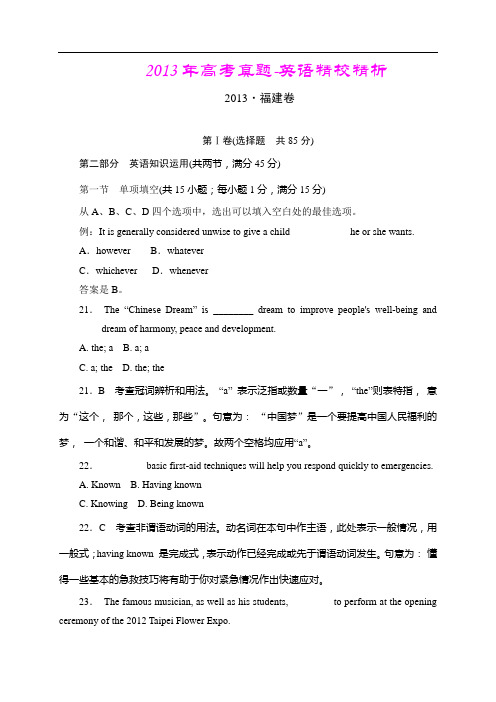
2013年高考真题-英语精校精析2013·福建卷第Ⅰ卷(选择题共85分)第二部分英语知识运用(共两节,满分45分)第一节单项填空(共15小题;每小题1分,满分15分)从A、B、C、D四个选项中,选出可以填入空白处的最佳选项。
例:It is generally considered unwise to give a child ________ he or she wants.A.however B.whateverC.whichever D.whenever答案是B。
21.The “Chinese Dream” is ________ dream to improve people's wellbeing and ________ dream of harmony, peace and development.A. the; aB. a; aC. a; theD. the; the21.B考查冠词辨析和用法。
“a”表示泛指或数量“一”,“the”则表特指,意为“这个,那个,这些,那些”。
句意为:“中国梦”是一个要提高中国人民福利的梦,一个和谐、和平和发展的梦。
故两个空格均应用“a”。
22.________ basic first-aid techniques will help you respond quickly to emergencies.A. KnownB. Having knownC. KnowingD. Being known22.C考查非谓语动词的用法。
动名词在本句中作主语,此处表示一般情况,用一般式;having known 是完成式,表示动作已经完成或先于谓语动词发生。
句意为:懂得一些基本的急救技巧将有助于你对紧急情况作出快速应对。
23.The famous musician, as well as his students, ________ to perform at the opening ceremony of the 2012 Taipei Flower Expo.A. were invitedB. was invitedC. have been invitedD. has been invited23.B考查主谓一致。
高考英语全国卷i完型填空翻译与精析
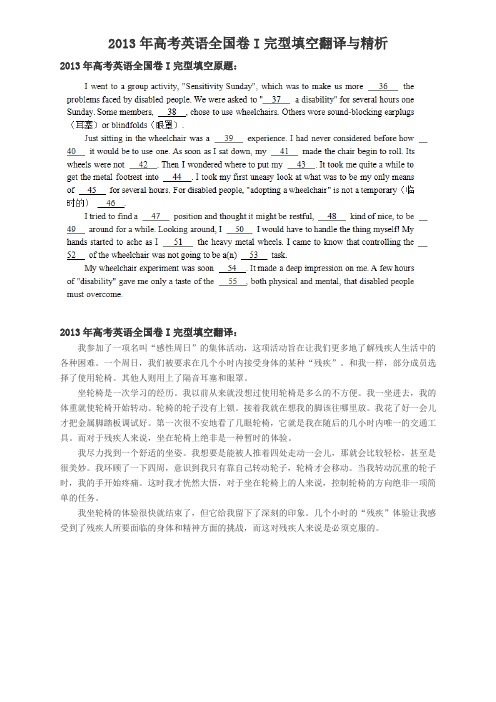
2013年高考英语全国卷I完型填空翻译与精析2013年高考英语全国卷I完型填空原题:2013年高考英语全国卷I完型填空翻译:我参加了一项名叫“感性周日”的集体活动,这项活动旨在让我们更多地了解残疾人生活中的各种困难。
一个周日,我们被要求在几个小时内接受身体的某种“残疾”。
和我一样,部分成员选择了使用轮椅。
其他人则用上了隔音耳塞和眼罩。
坐轮椅是一次学习的经历。
我以前从来就没想过使用轮椅是多么的不方便。
我一坐进去,我的体重就使轮椅开始转动。
轮椅的轮子没有上锁。
接着我就在想我的脚该往哪里放。
我花了好一会儿才把金属脚踏板调试好。
第一次很不安地看了几眼轮椅,它就是我在随后的几小时内唯一的交通工具。
而对于残疾人来说,坐在轮椅上绝非是一种暂时的体验。
我尽力找到一个舒适的坐姿。
我想要是能被人推着四处走动一会儿,那就会比较轻松,甚至是很美妙。
我环顾了一下四周,意识到我只有靠自己转动轮子,轮椅才会移动。
当我转动沉重的轮子时,我的手开始疼痛。
这时我才恍然大悟,对于坐在轮椅上的人来说,控制轮椅的方向绝非一项简单的任务。
我坐轮椅的体验很快就结束了,但它给我留下了深刻的印象。
几个小时的“残疾”体验让我感受到了残疾人所要面临的身体和精神方面的挑战,而这对残疾人来说是必须克服的。
2013年高考英语全国卷I完型填空答案精析:A. curious aboutB. interested inC. aware ofD. careful with解析:36.C 作者参加了一个名为“Sensitivity Sunday”的活动,该活动旨在让大家了解(aware of)残疾人面临的一些问题。
37. A. cure B. prevent C. adopt D. analyze解析:C 作者和参加活动的其他成员们必须在几小时内接受(adopt)“他们身体有残疾”这个假想的事实。
第二段的最后一句中的“adopting a wheelchair”也是暗示。
2013年高考试题及答案福建卷英语

掌门1对1教育高考真题2013福建高考英语试题第I卷(选择题共115分)第一部分听力(共两节,满分30分)第一节1. What does the man want to do?A. Take photos.B. Buy a camera.C. Help the woman.2. What are the speakers talking about?A. A noisy night.B. Their life in town.C. A place of living.3. Where is the man now?A. On his way.B. In a restaurant.C. At home.4. What will Celia do?A. Find a player.B. Watch a game.C. Play basketball.5. What day is it when the conversation takes place?A. Saturday.B. Sunday.C. Monday.笫二节(共15小题;每小题1.5分,满分22.5分)听第6段材料,回答第6、7题。
6. What is Sara going to do?A. Buy John a gift.B. Give John a surprise.C. Invite John to France.7. What does the man think of Sara's plan?A. Funny.B. Exciting.C. Strange.听第7段材料,回答第8、9题。
8. Why does Diana say sorry to Peter?A. She has to give up her travel plan.B. She wants to visit another city.C. She needs to put off her test.9. What does Diana want Peter to do?A. Help her with her study.B. Take a book to her friend.C. Teach a geography lesson.听第8段材料,回答第10至12题。
2013年福建省高考英语试题(word版)

2013年福建省高考英语试题英语试题第I卷(选择题共115分)第一部分听力(共两节,满分30分)做题时,先将答案标在试卷上。
录音内容结束后,你将有两分钟的时间将试卷上的答案转涂到答题卡上。
第一节(共5小题;每小题1.5分,满分7.5分)听下面5段对话。
每段对话后有一个小题,从题中所给的A、B、C三个选项中选出最佳选项,并标在试卷的相应位置。
听完每段对话后,你都有10秒钟的时间来回答有关小题和阅读下一小题。
每段对话仅读一遍。
例:How much is the shirt?A.£ 19.15B. £ 9.15C. £ 9.18答案是B。
1.What does the man want to do?A.Take photosB.Buy a cameraC.Help the woman2.What are the speakers talking about?A.A noisy night B.Their life in town C.A place of living3.Where is the man now?A.On his wayB.In a restaurantC.At home4.What will Celia do?A.Find a playerB.Watch gameC.Play basketball5.What day is it when the conversation takes place?A.SaturdayB.SundayC.Monday第二节(共15小题;每小题1.5分,满分22.5分)听下面5段对话或独白。
每段对话或独白后有几个小题,从题中所给的A、B、C三个选项中选出最佳选项,并标在试卷的相应位置。
听每段对话或独白前,你将有时间阅读各个小题,每小题5秒种,各小题将给出5秒种的作答时间。
每段对话或独白读两遍。
听第6段材料,回答第6、7题。
6.Why is Sara going to do?A.Buy John a giftB.Give John a surpriseC.Invite John to France7.What does the man think of Sara’s plan?A.FunnyB.ExcitingC.Strange听第7段材料,回答第8、9题。
2013年高考真题——英语(福建卷) Word版含答案
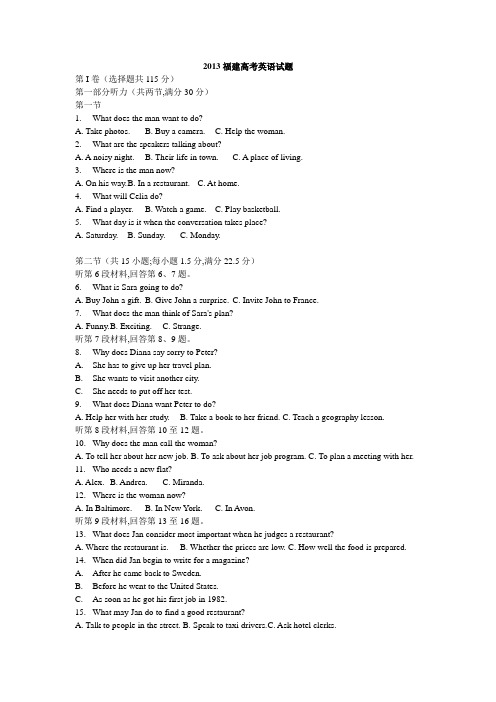
2013福建高考英语试题第I卷(选择题共115分)第一部分听力(共两节,满分30分)第一节1. What does the man want to do?A. Take photos.B. Buy a camera.C. Help the woman.2. What are the speakers talking about?A. A noisy night.B. Their life in town.C. A place of living.3. Where is the man now?A. On his way.B. In a restaurant.C. At home.4. What will Celia do?A. Find a player.B. Watch a game.C. Play basketball.5. What day is it when the conversation takes place?A. Saturday.B. Sunday.C. Monday.笫二节(共15小题;每小题1.5分,满分22.5分)听第6段材料,回答第6、7题。
6. What is Sara going to do?A. Buy John a gift.B. Give John a surprise.C. Invite John to France.7. What does the man think of Sara's plan?A. Funny.B. Exciting.C. Strange.听第7段材料,回答第8、9题。
8. Why does Diana say sorry to Peter?A. She has to give up her travel plan.B. She wants to visit another city.C. She needs to put off her test.9. What does Diana want Peter to do?A. Help her with her study.B. Take a book to her friend.C. Teach a geography lesson.听第8段材料,回答第10至12题。
2013年高考英语试题-福建卷(含答案)

2013年普通高等学校招生全国统一考试(福建卷)英语21. The "Chinese Dream" is ____ dream to improve people's well-being and ____ dream of harmony, peace and development.A. the; aB. a; aC. a; theD. the; the22. _____ basic first-aid techniques will help you respond quickly to emergencies.A. KnownB. Having knownC. KnowingD. Being known23. The famous musician, as well as his students, ____ to perform at the opening ceremony of the2012 Taipei Flower Expo.A. were invitedB. was invitedC. have been invitedD. has been invited24. Michelle found a job as a high school teacher which _____ spending quite a lot of time withstudents.A. enjoysB. involvesC. practicesD. suggests25. The Forbidden City attracts a _____ stream of visitors every day, especially during nationalholidays.A. constantB. mainC. powerfulD. shallow26. The girl has a great interest in sport and ____ badminton classes twice a week over the lastthree years.A. tookB. is takingC. takesD. has been taking27. The book tells stories of the earthquake through the eyes of those ____ lives were affected.A. whoseB. thatC. whoD. which28. Old-fashioned phones matter when wireless networks _____in disasters.A. turn downB. turn outC. break downD. break out29. Mrs. Smith finds it hard to clear up the mess, as her children are always ____ whenever shetries to.A. in the wayB. on watchC. in sightD. on the line30. —Do you think George has passed the driving test?—No. If so, he _____his car to our college yesterday.A. would driveB. droveC. would have drivenD. had driven31. Those poor and needy teenagers were excited to find a shop at the corner where they couldbuy ____ priced bikes.A. competitivelyB. recentlyC. reasonablyD. affordably32. Anyone, once ____ positive for H7N9 flu virus, will receive free medical treatment from ourgovernment.A. to be testedB. being testedC. testedD. to test33. —Would you mind answering some questions on shopping habits?— ________.A. Yes, with great pleasureB. No, I am afraid I can't make itC. Yes, it is worth the timeD. No, as long as it doesn't take long34. Not until he went through real hardship _____the love we have for our families is important.A. had he realizedB. did he realizeC. he realizedD. he had realized35. A society cannot be successful if it throws tradition away, but it cannot be successful ____if we do something to stop progress.A. eitherB. neitherC. tooD. also第二节完形填空We have been driving in fog all morning, but the fog is lifting now. The little seaside villages are 36 , one by one. "There is my grandmother's house," I say, 37 across the bay to a shabby old house.I am in Nova Scotia on a pilgrimage (朝圣) with Lise, my granddaughter, seeking roots for her, retracing (追溯) 38 memory for me. Lise was one of the mobile children, 39 from house to house in childhood. She longs for a sense of 40 , and so we have come to Nova Scotia where my husband and I were born and where our ancestors 41 for 200 years.We soon 42 by the house and I tell her what it was like here, the memories 43 back, swift as the tide (潮水).Suddenly, I long to walk again in the 44 where I was once so gloriously a child. It still 45 a member of the family, but has not been lived in for a while. We cannot go into the house, but I can still walk 46 the rooms in memory. Here, my mother 47 in her bedroom window and wrote in her diary. I can still see the enthusiastic family 48 into and out of the house. I could never have enough of being 49 them. However, that was long after those childhood days. Lise 50 attentively as I talk and then says, " So this is where I 51 ; where I belong. "She has 52 her roots. To know where I come from is one of the great longings of the human 53 To be rooted is "to have an origin". We need 54 origin. Looking backward, we discover what is unique in us; learn the 55 of "I". We must all go home again—in reality or memory.36.A. appearing B. moving C. exposing D. expanding37.A. referring B. travelling C. pointing D. coming38.A. shared B. short C. fresh D. treasured39.A. passed B. raised C. moved D. sent40.A. home B. duty C. reality D. relief41.A. built B. lived C. remained D. explored42.A. catch up B. pull up C. step down D. come down43.A. falling B. turning C. rushing D. bringing44.A. yard B. village C. room D. house45.A. adapts to B. appeals to C. belongs to D. occurs to46.A. across B. through C. along D. past47.A. lay B. played C. stood D. sat48.A. marching B. looking C. breaking D. pouring49.A. between B. with C. near D. behind50.A. wonders B. listens C. reacts D. agrees51.A. began B. grew C. studied D. stayed52..A. deepened B. recognized C. accepted D. found53.A. heart B. rights C. interest D. behaviors54.A. one B. its C. that D. every55.A. meaning B. expression C. connection D. background第三部分阅读理解AWhen I was 12, all I wanted was a signet (图章) ring. They were the "in" thing and it seemed every girl except me had one. On my 13th birthday, my Mum gave me a signet ring with my initials(姓名首字母) carved into it. I was in heaven.What made it even more special was that it was about the only thing that wasn't being "replaced". We'd been burnt out in fires that swept through our area earlier that year and had lost everything—so most of the " new" stuff (东西) we got was really just to replace what we'd lost. But not my ring. My ring was new.Then, only one month later, I lost it. I took it off before bed and it was missing in the morning.I was sad and searched everywhere for it. But it seemed to have disappeared. Eventually, I gave up and stopped looking for it. And two years later, we sold the house and moved away.Years passed, and a couple of moves later, I was visiting my parents' when Mum told me that she had something for me. It wasn't my birthday, nor was it Easter or Christmas or any other gift-giving occasion. Mum noticed my questioning look. " You'll recognize this one," she said, smiling.Then she handed me a small ring box. I took it from her and opened it to find my beautiful signet ring inside. The family who had bought our house 13 years earlier had recently decided to do some redecorations, which included replacing the carpets. When they pulled the carpet up in my old bedroom, they found the ring. As it had my initials carved into it, they realized who owned the ring. They'd had it professionally cleaned up by a jeweler before sending it to my mother. And it still fits me.56. The underlined word "in" in the first paragraph probably means "_____".A. fashionableB. availableC. practicalD. renewable57. When she got the ring back, the writer was about _____.A. 13 years oldB. 15 years oldC. 26 years oldD. 28 years old58. Which of the following is TRUE according to the passage?A. The writer's family moved several times.B. The writer never stopped looking for her ring.C. The writer's ring was cleaned up by the new house owner.D. The writer lost her ring in the morning when she took it off.59. What would be the best title for the passage?A. My New RingB. Lost and FoundC. Lost and ReplacedD. An Expensive RingBYour glasses may someday replace your smartphone, and some New Yorkers are ready for the switch. Some in the city can't wait to try them on and use the maps and GPS that the futuristic eyewear is likely to include." I'd use it if I were hanging out with friends at 3 a. m. and going to the bar and wanted to see what was open," said Walter Choo, 40, of Fort Greene.The smartphone-like glasses will likely come out this year and cost between $250 and $600, the Times said, possibly including a variation of augmented(增强的) reality, a technology already available on smartphones and tablets (平板电脑) that overlays information onto the screen aboutone's surroundings. So, for example, if you were walking down a street, indicators would pop up showing you the nearest coffee shop or directions could be plotted out and come into view right on the sidewalk in front of you." As far as a mainstream consumer product, this just isn't something anybody needs," said Sam Biddle, who writes for . " We're accustomed to having one thing in our pocket to do all these things," he added, "and the average consumer isn't gonna be able to afford another device (装置) that's hundreds and hundreds of dollars. "9to5Google publisher Seth Weintraub, who has been reporting on the smartphone-like glasses since late last year, said he is confident that this type of wearable device will eventually be as common as smartphones."It's just like smartphones 10 years ago," Weintraub said. "A few people started getting emails on their phones, and people thought that was crazy. Same kind of thing. We see people bending their heads to look at their smartphones, and it's unnatural," he said. " There's gonna be improvements to that, and this a step there. "60. One of the possible functions of the smartphone-like glasses is to ____.A. program the opening hours of a barB. supply you with a picture of the futureC. provide information about your surroundingsD. update the maps and GPS in your smartphones61. The underlined phrase "pop up" in the third paragraph probably means " ____".A. develop rapidlyB. get round quicklyC. appear immediatelyD. go over automatically62. According to Sam Biddle, the smartphone-like glasses are ____.A. necessary for teenagersB. attractive to New YorkersC. available to people worldwideD. expensive for average consumers63. We can learn from the last two paragraphs that the smartphone-like glasses ____.A. may have a potential marketB. are as common as smartphonesC. are popular among young adultsD. will be improved by a new technologyCThis is What a REAL Silver Dollar Looks LikeIf you trust in the yen, the euro, and the dollar... stop reading.Because this is a story about the silver coin EVERYBODY wants.You read the headlines. You know that troubled economic times have put global currency on a rollercoaster ( ride. But millions have found a smarter way to build long-term value withhigh-grade collectable silver. And right now, those people are lining up to secure some of the last 2012 U. S. Mint Silver Eagles, America's Newest Silver Eagle Dollars. Today, you can graduate to the front of that line. Buy now and you can own these brilliant uncirculated Silver Dollars for only $38.95!You Can't Afford to LoseWhy are we releasing (发行) this silver dollar for such a remarkable price? Because we want to introduce you to what hundreds of thousands of smart collectors and satisfied customers have known since 1984—New York Mint is the place to find the world's finest high-grade coins. That's why we're offering you this Brilliant Uncirculated 2012 U. S. Silver Eagle for as little as $37.45 (pl US s/h).Timing is EverythingOur advice? Keep this to yourself. Because the more people who know about this offer, the worse it is for you. Demand for Silver Eagles in 2011 broke records. Experts predict that 2012 Silver Eagles may break them all over again. Due to rapid changes in the price of silver, prices may be higher or lower and are subject to(受...影响) change without notice. Supplies are limited. Call immediately to add these Silver Eagles to your holdings before it's too late.Offer Limited to 40 per household 2012 American Silver Eagle CoinYour cost 1-4 Coins$38.95 each + s/h5-9 Coins$38.45 each + s/h10-19 Coins$37. 95 each + s/h20-40 Coins$37.45 each + s/hNote: $10 s/h (shipping and handling) for each purchaseFor fastest service, call toll-free 24hours a day1-888-201-7143Offer Code (代码) ASE177-04Please mention this code when you call.New York Mint 14101Southcross Drive W.,Dept. ASE177-04Burnsville, Minnesota 55337www. NewYorkMint. com64. What is stressed in the ad?A. The coin is of high quality and worth collecting.B. The coin can be circulated as a currency.C. Limited supplies guarantee a stable price of the coin.D. Demand for the coin is bound to break records.65. If you buy six 2012 U. S. Mint Silver Eagles by post, you should pay at least ____.A. $230.7B. $233.7C. $240.7D. $243.766. The ad strongly encourages people to purchase the silver coins by ____.A. shopping onlineB. making a phone callC. lining up in front of the storesD. writing to the companyDPride and Prejudice for the Modern WomanLet us imagine how Pride and Prejudice, Jane Austen's most famous work, might beupdated, 200 years on.Austen's popularity is rooted in her intelligence. But today she would certainly have had a very different life, as would her characters. Here's my own suggestion. . .It is a truth finally and universally acknowledged that a single woman with brains deserves to have equal opportunities to men, however disadvantaged she may feel by sexism." My dear husband," said his hopeful wife one day, " have you heard that the local store, standing empty for so long, is taken over by a bright young businesswoman?"Her dull and indifferent (漠不关心的) husband replied that he had not. "But it is, it is," she replied excitedly. Mr Dull-Husband made no reply."Don't you want to know her plans?" she cried with some impatience."Well, clearly you think it matters to your silly little head. .. so I'd better listen. ""Well, my dear, the rumour (传言) is that she has already set up a string of successful businesses in northern England, though how a woman can know anything about that is beyond me. She will move in herself next month. " "What is her name?" "Bingley. ""Is she married or single?""What a question! And none of your business. But her coming will be a fine thing for our five boys. " "How so? How can it possibly affect them? ""My dear love; those lazy boys need something to wake them up. There are bound to be jobs going. "" Is that her point in settling here? Surely as a woman she has simply taken a fancy to the place. "" Nonsense, my love, how little you've noticed the world has changed. She's got a first-rate degree and some sort of business qualification, I'm told. She surely needs one of our boys! Perhaps you might give her a call. "" Me? No. Perhaps you can take an interest. You still have your looks, after all. She may even offer you a job. " "Oh, that's not likely. These new chances belong to the younger generation. But now you mention it, I think I'll go along all the same. "And Mrs Bennet went along. That was 10 years ago. She is now managing director of a FTSE-listed company.... It would remain the case, of course, that Mrs Bennet would be one of very few women on the company board, that her salary would be lower than her male colleagues, her bonus of a more "female" dimension and her lifespan (年限) among the city's business leaders shorter than theirs. Still, she'd no doubt have enjoyed Davos—and might even have hobnobbed (攀谈) with influential figures.67. Which of the following is TRUE according to the passage?A. Austen was born 200 years ago.B. Austen rewrote Pride and Prejudice.C. Austen's success lies in her wisdom.D. Austen's updated work gains popularity.68. The underlined part in the passage suggests that Mrs Bennet ____.A. had mixed feelings of admiration and surprise about BingleyB. felt kind of worried and doubtful about BingleyC. was extremely anxious to meet BingleyD. had a great curiosity about Bingley69. In the eyes of Mrs Bennet, Bingley surely needed one of their boys to ____.A. get married toB. work for herC. help her move inD. take over her store70. What does the writer intend to tell us?A. Women with brains can also be as successful as men.B. Women have to pay a high price for success.C. A judgment must be made free from prejudice.D. Sex discrimination still exists nowadays.EA MENTORING (导师制) program is giving life changing opportunities to Banbury youth. Young Inspirations was founded two years ago to provide mentoring sessions for students and unemployed young adults aged 11 to 21.Alex Goldberg, the program's founder, said; "We set up Young Inspirations because we wanted to give young people experiences which will potentially be life changing and broaden their outlook. "We try to create work experience opportunities that will really make a difference to our youth. For example, we've secured internships (实习) with world-famous firms such as Honda."At a time of funding cutbacks where schools are finding it more and more difficult to offer this kind of mentoring, it is extremely important that these opportunities are available both to help youth with their school work and grades and to give them opportunities which may help shape their futures. " Kieran Hepburn, 14, is one of a group of Banbury youth who has benefited from the program so far. In October the Banbury School pupil was accompanied by Young Inspirations staff to Paris where he was an observer at the United Nations Educational, Scientific and Cultural Organization's (UNESCO) International Youth Forum (论坛).The event was held for young people from around the world, to seek their views on how the future of youth and education should look. Kieran joined several hundred observers mostly in their 20s and was the only UK school pupil to attend the event. Kieran thinks the trip was a life changing experience. " Before we left I didn't quite know what to make of it but when we got there we didn't stop, it was amazing," he said, " We went to three or four hours of debates each day and then did something cultural each afternoon. "The main theme of the forum was how youth can drive change in political and public life. It dealt with issues (问题) such as drug abuse, violence and unemployment.Kieran said: " It has really helped me to improve my confidence and social skills as well as my school grades and I was voted most improved pupil at school in August. "The Young Inspirations mentoring sessions take place each Friday in Banbury. For details visit .71. The Young Inspirations mentoring program aims to _____.A. train staff for world-famous firmsB. offer job opportunities to young adultsC. provide youth with unique experiencesD. equip the unemployed with different skills72. According to Alex Goldberg, it is difficult for schools to offer the mentoring due to _____.A. the lack of support from firmsB. the cultural differencesC. the effect of unemploymentD. the shortage of money73. According to the passage, the forum focused on how youth can ____.A. build up their confidence at schoolB. find work experience opportunitiesC. improve their social skills for the futureD. play an active role in the change of society74. We can learn from the passage that _____.A. the visit to the United Kingdom was amazingB.Kieran has made great progress in many aspectsC. the youth have found a way to solve their problemsD. the mentoring sessions are held every day except Friday75. What would be the best tide for the passage?A. Alex Goldberg, Founder of Young InspirationsB. Young People Find a World of OpportunityC. Kieran, Banbury School Pupil to ParisD. Debates Help Youth with Their Grades第二节书面表达(满分25分)孩子的成长和教育是社会热议的话题,现今父母包揽一切、孩子过度依赖等现象十分严重。
- 1、下载文档前请自行甄别文档内容的完整性,平台不提供额外的编辑、内容补充、找答案等附加服务。
- 2、"仅部分预览"的文档,不可在线预览部分如存在完整性等问题,可反馈申请退款(可完整预览的文档不适用该条件!)。
- 3、如文档侵犯您的权益,请联系客服反馈,我们会尽快为您处理(人工客服工作时间:9:00-18:30)。
2013年高考英语福建卷完型填空翻译与精析
2013年高考英语福建卷完型填空原题:
2013年高考英语福建卷完型填空翻译:
整个上午我都在雾中行驶,但是现在雾开始散去,于是海边的小村庄一个接一个地出现在我们的视野中。
“这是我祖母的房子,”我边说边指着海湾那边的一栋旧房子。
我和孙女利兹一起在(加拿大)新斯科舍省参谒祖居,为孙女寻根问祖,为自己追寻回忆。
利兹小时候也是属于东奔西走的孩子,搬了一个又一个的家。
她渴望家的感觉,所以我们来到了新斯科舍,这是我和丈夫的出生地,也是我的祖祖辈辈生活了200多年的地方。
很快我们把车停在了这栋房子旁边,我告诉孙女从前这里的样子。
回忆如潮,汹涌而至。
突然,我想在那座房子里再走一圈,我做孩子的时候就住在里面,无比荣耀。
这栋房子还是属于我们家的,只是很久没有人住了。
我们不能进到房子里,但是我仍能在记忆中穿梭于各个房间。
在这栋房子里,母亲曾坐在卧室的窗旁写日记。
我还能看到热情的家庭成员往来于这栋房子。
我曾对和家人待在一起的日子无限向往,如痴如狂。
然而,那时美好童年已成为遥远的过去。
我说的时候利兹认真地听着,然后说了一句:“这就是我生命开始的地方,这就是我的归属地。
”
我的孙女找到了自己的根。
知道自己来自哪里是人类内心的巨大渴望之一。
归根就是求源。
我们需要找到这个本原。
回首过去,我们发现自己身上独特的地方,领悟“我”的含义。
我们都必须再次回到故乡,身回也好,心回也罢!
2013年高考英语北京卷完型填空答案精析:
36. A. appearing B. moving C. exposing D. expanding
解析:A 整个上午我都在雾中行驶,但是现在雾开始散去,于是海边的小村庄一个接一个地出现(appearing)在我们的视野中。
上句中的lifting表示”(雾)散去”,是答案提示。
37. A. referring B. traveling C. pointing D. coming
解析:C “这是我祖母的房子,”我边说边指着海湾那边的一栋旧房子。
point to“指着”,符合语境。
38. A. shared B. short C. fresh D. treasured
解析:D 我陪伴孙女去追溯珍贵的(treasured)回忆。
39. A. passed B. raised C. moved D. sent
解析:C 根据空前的mobile“流动的”可知,此处应选C项。
40. A. home B. duty C. reality D. relief
解析:A 根据上句中的“from house to house in childhood”可知,Lise渴望家(home)的感觉。
故选A项。
41. A. built B. lived C. remained D. explored
解析:B Nova scotia是丈夫和我出生的地方,也是我们的祖先生活(lived)了200年的地方。
42.A. catch up B. pull up C. step down D. come down
解析:B 很快我们把车停在了那栋房子旁。
pull up“停靠”,符合语境。
43. A. falling B. turning C. rushing D. bringing
解析:C 根据空后的“swift as the tide(潮水)”可知,此处应选C项。
44. A. yard B. village C. room D. house
解析:D 根据第三段中的“by the house”可知,此处应选D项。
45. A. adapts to B. appeals to C. belongs to D. occurs to
解析:C 这个房子现在仍然属于(belongs to)我们家的一个成员,但有一段时间无人居住了。
46. A. across B. through C. along D. past
解析:B 我们不能进到房子里,但是我仍能在记忆中穿梭于各个房间。
across强调“从表面通过”;through强调“通过空间”,故选B项。
47. A. lay B. played C. stood D. sat
解析:D 根据空后的“wrote in her diary”可知,此处表示妈妈坐(sat)在卧室的窗户旁写日记。
48. A. marching B. looking C. breaking D. pouring
解析:D 我还能看到热情的家庭成员往来于这栋房子。
Pour into“涌进”,符合语境。
49. A. between B. with C. near D. behind
解析:B could never have enough of sth.意为“对某物如痴如狂”,结合语境可知,此处表示我对和家人待在一起如痴如狂。
50. A. wonders B. listens C. reacts D. agrees
解析:B 当我说话时,Lise仔细倾听(Listens)。
51. A. began B. grew C. studied D. stayed
解析:A 我的孙女说,“这就是我生命开始(began)的地方。
语境没有足够的信息表明孙女在这里成长、学习及停留。
52. A. deepened B. recognized C. accepted D. found
解析:D 根据前文的“where I belong”可知,此处意为我的孙女Lise找到了她的根。
53. A. heart B. rights C. interest D. behaviors
解析:A 知道自己来自哪里是人类内心(heart)的巨大渴望之一。
54. A. one B. its C. that D. every
解析:C 根据空前的“to have an origin”可知,此处特指前文中的origin,故选that。
55. A. meaning B. expression C. connection D. background
解析:A 回首过去,我们发现自己身上独特的地方,领悟“我”的含义(meaning)。
